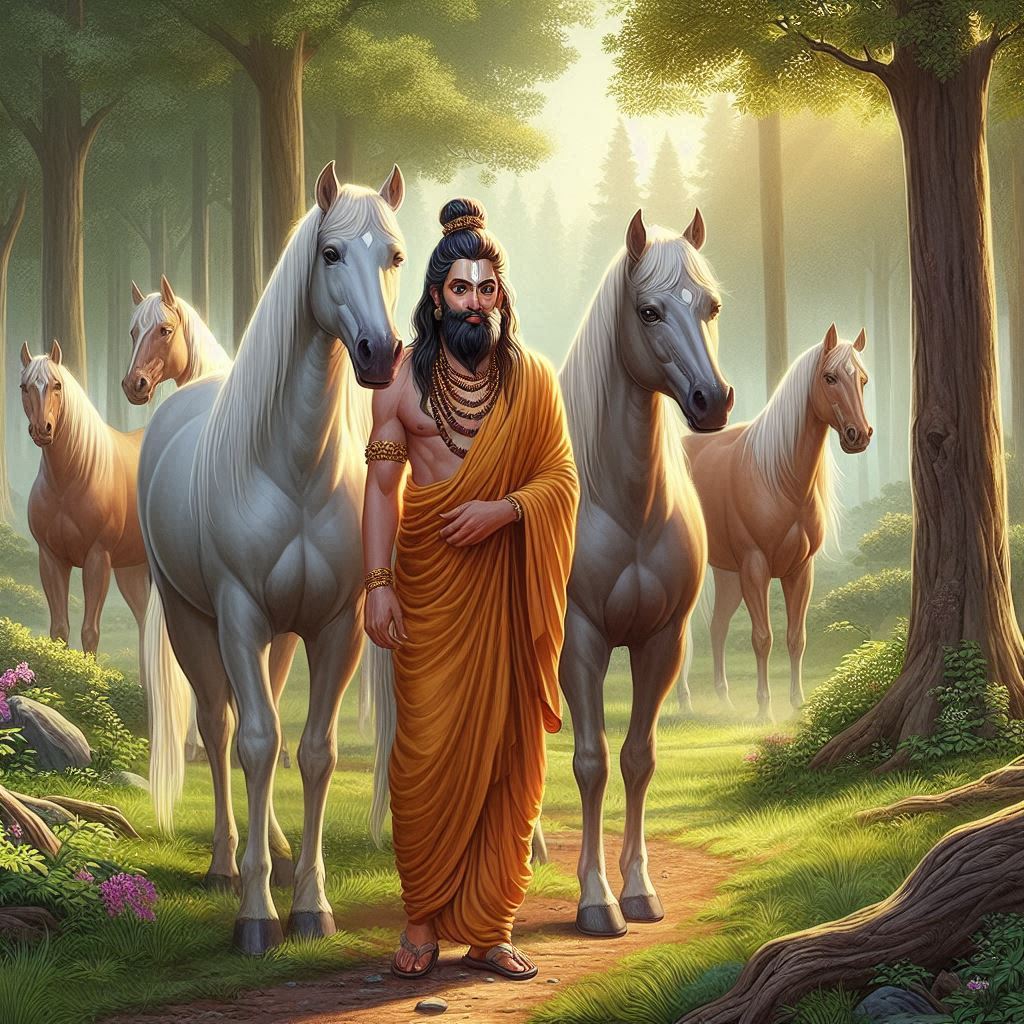Parikshit of the Ikshvaku Lineage – Stories from Aranyaka Parva
Yudhistira continued to ask Rishi Markandeya to tell them more stories. This time, the rishi spoke about a king named Parikshit of the Ikshvaku lineage from the older days.

One day, King Parikshit went on a hunt in a forest. He found some deer and pursued them on his horse. The herd scattered, and the king was exhausted. Seeing a dark cluster of trees, he went to explore the region and found a beautiful pond in the center. He jumped inside to take a bath and washed his horse. He played with the lotus flowers and stems for a while, relaxing in the refreshing space.
Just then, he heard a melodious voice singing a song. Parikshit looked around, wondering who that voice belonged to. A beautiful woman walked that way, singing and picking flowers. The king called out to her and asked who she was, and said he was in love with her. She replied that she could be his only if he made a promise. The king asked what it was. The woman told him he should never show her water. He agreed. They sat there for a while when his soldiers arrived.
The king returned to his city with the woman and married her. Parikshit then ordered his prime minister to build a place where water wouldn’t reach. The prime minister got a grove constructed with flowers, plants, and trees, but without water. Once it was ready, the king and his wife spent their time there.
However, one day, the king saw a pond hidden in the grove and sat beside it with his queen. Forgetting her previous words, he suggested that they get into the pond and have some fun. The woman agreed. The king realized that he couldn’t find his wife anywhere in the pond. There were only a bunch of frogs. The angry king ordered all frogs to be killed and said anyone who wished to see him should bring a dead frog as tribute.
As people began killing the frogs, the king of the frogs went to Parikshit in the guise of an ascetic. He recited two shlokas and asked him not to kill innocent animals in anger, and asked what purpose the killing served.
The king replied that he could not forgive the frogs since they killed his beloved queen and deserved to die. The Brahmin said that he was Ayu, the king of frogs, and Parikshit’s wife was his daughter Sushobana. He explained that his daughter had a habit of deceiving kings this way, and Parikshit wasn’t her first victim.
Parikshit said that he still wanted her. So, Ayu brought his daughter to him and handed her over to her husband. He then cursed her for her falsehood and deceit that her sons would be the haters of Brahmins. Parikshit was happy to get back the woman he loved and thanked Ayu.
Sometime later, they had three sons – Shala, Dala, and Bala. When the king became old, he installed his oldest, Shala, on the throne and went into the forest to spend the rest of his life.
Shala ruled for a few years.
One day, he went on a hunt and was pursuing a deer. His charioteer said they should stop since the horses on the chariot weren’t capable of catching the deer, and only the Vamya horses could do that. Shala asked the charioteer to tell him about the Vamya horses and threatened to kill him otherwise. The charioteer replied that the Vamya horses belonged to Vamadeva. Shala ordered him to drive to Vamadeva’s ashram. The charioteer did so.
Shala asked Vamadeva for the Vamya horses to chase the deer he hit with the arrow. Vamadeva agreed, but on the condition that the horses should be returned after catching the deer. Shala accepted the terms to take the horses but didn’t want to return them. So, he rode back to the kingdom with the Vamya horses.
Vamadeva realized the truth and sent his disciple to Shala, who said rich kings should possess such horses and not Brahmins, so he wouldn’t give them back. Vamadeva was furious. He personally went to Shala, who refused to return the horses and instead offered bulls, donkeys, and another breed of horses. Vamadeva finally decided he had enough. He announced that his tapasya powers would create a rakshasa that would pierce the king with long spears and kill him. Shala didn’t yield. Even when a rakshasa appeared out of nowhere and rushed at him, Shala yelled that he wouldn’t return the horses, not even if all his ancestors ordered him to do so. However, the rakshasa lunged and killed him.
With Shala dead, they made Dala the king. Vamadeva went to Dala to get back his horses. However, he was no different from his brother. In fact, he was worse. Dala ordered his men to bring poisoned arrows to kill Vamadeva for asking him to return the horses. Vamadeva told Dala that he would end up killing his own ten-year-old son with those arrows. As cursed, the men bringing the arrows tried it inside the palace and accidentally killed the king’s son. Dala asked for more arrows as he was determined to kill Vamadeva.
Vamadeva calmly said that Dala wouldn’t be able to release the arrow, though he had it aimed. No matter how much he tried, Dala couldn’t release the arrow. At last, he gave up. Satisfied, Vamadeva told the king to touch his queen with the arrow to revive his son. The queen rushed to Vamadeva to take his blessings. He offered her a boon. She asked for her husband to be freed from the sin and for them to have many children and grandchildren.
Vamadeva gave her the boon. Thankful for this gesture, Dala returned the Vamya horses to their rightful owner and learned his lesson.
